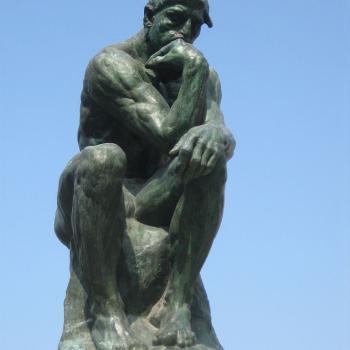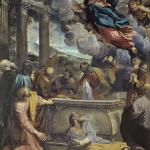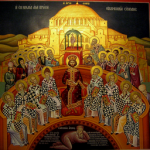
Alexander Pope gave us the famous dictum, “To err is human; to forgive is divine.” One of the central elements of the Christian faith is its teaching on forgiveness. First, it reveals to us that God’s love is so great, God is willing to and able to forgive us, no matter what we have done. There is nothing which is unforgiveable so long as we embrace and accept forgiveness. But then it tells us, once we have been forgiven, we are expected to embrace forgiveness so much we make it a way of our being so that we not only receive it, but share it with others. We must truly take forgiveness to heart.
Everyone makes mistakes. Every does wrong. But those mistakes, those errors, the evils which we do, do not have to define us. With God’s forgiveness, and the grace which comes from it, we will change. We will become the person we are intended to be instead of the fallen, selfish individual who looks at all things in light of unenlightened self-interest. So long as we view the world in that fallen mode of being, with and through such unenlightened self-interest, we will be unwilling to forgive others. Certainly, sometimes it is easy to grant such forgiveness, while at other times, it will be extremely difficult. Indeed, if it were not for the grace we were granted, we would find it impossible. However, since forgiveness is granted to us by God, Pope is correct, and it is divine, as it is revealed as being one of the uncreated energies of God. When we truly attune ourselves to it, we will find the forgiveness we have accepted will transform us and help us become more and more like God; the more we take it in, the more we will find ourselves participating in the divine life as it relates to us, and so, we will find that such participation will grant us the ability to do what we would otherwise not be able to do, and grant forgiveness to everyone. Thus, with the grace we are given in our own forgiveness, we find it becomes possible to share forgiveness with others; when we deny forgiveness, however, we cut ourselves off from the uncreated energy of God’s forgiveness, and so cut ourselves off from the grace we need for our own forgiveness and our own perfection.
We need to learn to let go and forgive. This is not to say we should forget what was done and act as if nothing happened. That is not what forgiveness is about. All actions have consequences which must be dealt with and engaged. We must make sure whatever justice was lost can be and will be restored. What we need to realize is that it is impossible to do so if we let bitterness rule over our lives. We must, therefore, accept the role of forgiveness and mercy in connection with justice, and we must realize justice must be restorative not retributive, for all retribution does is makes things worse.
Forgiveness, therefore, is an important element in the Christian faith. We need forgiveness from God, but we also need it from others, even as others need it from us. We are in the world together. We need to find a way to embrace universal forgiveness. We also need to recognize when we go astray, we should do what we can to make amends for what we have done. We must do what we can to reform, and one of the most important ways we can do that, is to embrace mercy as a way of life. The more we embrace mercy and the forgiveness it offers, the more we will find ourselves transformed by it, becoming more and more like God, and so more and more like the person God wants us to be, a person who can and will have a share in the divine life itself. To do that, we must stop being judgmental, stop looking to others to judge and condemn them. When we render such judgment and condemn someone, we show we do not really forgive them, and if we are unwilling to forgive, we cut ourselves off from the uncreated energy of God’s forgiveness, risking that we will not experience the grace of forgiveness ourselves: “For if you forgive men their trespasses, your heavenly Father also will forgive you; but if you do not forgive men their trespasses, neither will your Father forgive your trespasses” (Matt. 6:14-15 RSV). Sin does not have to have the final say, but if we are unwilling to accept the way of mercy, we let it have the final say over us; then, we will experience the end God has in store for sin and all that is attached to it.
“But put on the Lord Jesus Christ, and make no provision for the flesh, to gratify its desires” (Rom. 13:14 RSV). We are to put on Jesus, that is, to find ourselves united with him. Jesus is the light of the world. He offers the world God’s love, and so, if we put him on, if we act in relation to our union with him, we will not let ourselves be turned towards the darkness of hate which knows no mercy. We will be charitable towards others. We will not put our own likes and dislikes above them. We will not force everyone to satisfy our inordinate “fleshy” desires. We will recognize people will be at different positions in their lives than we are, and to deal with that, we will try to make sure everyone gets the help they need instead of discouraging them with our condemnation, which is why Paul said:
As for the man who is weak in faith, welcome him, but not for disputes over opinions. One believes he may eat anything, while the weak man eats only vegetables. Let not him who eats despise him who abstains, and let not him who abstains pass judgment on him who eats; for God has welcomed him. Who are you to pass judgment on the servant of another? It is before his own master that he stands or falls. And he will be upheld, for the Master is able to make him stand (Rom 14:1-4 RSV).
We should embrace God, what is divine, and do what we can to be more like God. God is merciful. God is loving. God is kind. God offers forgiveness to all. We should be likewise. And, to be sure, while this is for the good of others, it is also for our own good. By forgiving others like God, we open ourselves to God, freeing ourselves to participate in uncreated energies of God and all the glory they can bring to us.
To err is human, especially when we think of humanity apart from God; to forgive is divine, but thanks to the incarnation, forgiveness is an aspect of the divinity which we can partake of and share in. We are called to do just that. The more we embrace the path of mercy and grace, the more forgiving we are, the more we reveal how much we have partaken of the uncreated divine energies of God and become like God. We will show we treasure God for, “For where your treasure is, there will your heart be also” (Matt. 6:21 RSV). If we treasure God and the divine life, we will treasure mercy and forgiveness, and others will see the fruit of it in our lives. If we, on the other hand, hold onto bitterness and resentment, we will be far from God and we will show our treasure is not with God, but ourselves.
Stay in touch! Like A Little Bit of Nothing on Facebook.
If you liked what you read, please consider sharing it with your friends and family!
N.B.: While I read comments to moderate them, I rarely respond to them. If I don’t respond to your comment directly, don’t assume I am unthankful for it. I appreciate it. But I want readers to feel free to ask questions, and hopefully, dialogue with each other. I have shared what I wanted to say, though some responses will get a brief reply by me, or, if I find it interesting and something I can engage fully, as the foundation for another post. I have had many posts inspired or improved upon thanks to my readers.
















